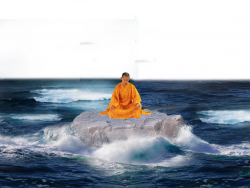Buddhist Values and Globalization by Hema Goonatilake
Introduction
The aim of this paper is to examine the extent to which Buddhist values and ideas could be realised in the face of globalization. Let me begin with a personal note. I come from Sri Lanka which in the first millennium was at the crossroads of the then globalisation. This is indicated by the majority group of Sinhalese having the largest genetic diversity in the country compared to other ethnic groups - over the centuries there had been genetic mixing from various parts of the world. The then Sinhalese, almost exclusively Buddhist, travelled to the then far corners of the world as revealed by records in Rome, China, Southeast Asia and the lands in between. Buddhism itself was carried through travel and the then incipient globalisation to East Asia and West Asia and possibly even further afield. So, Buddhism was in the forefront of the global travel of ideas. Buddhists should not, therefore, be afraid of the global as it is in their "genes" as it were.
Capital, technology, knowledge and to a lesser extent, labour had become much more mobile in today's globalised order. Globalisation in culture today is brought about by people sharing their thoughts, actions, ideas, in short, their culture, across vast distances. This is through mass tourism, migrant workers and refugees. Penetration of trade, financial links, travel and telecommunications increase this shared universe. Globalisation cuts both ways for Buddhists. Globalisation has helped Asian countries almost all having the imprint of Buddhism if not now during their history to become rising economic powers. Globalisation has also resulted in the spread of Buddhist practices like meditation to all parts of the world and seems to be following the spread of yoga practices in earlier decades to become in the future almost a household Western practice. International exchange of Buddhist scholars and practitioners has facilitated the spread of Buddhist ideas across the globe.
Adverse Aspects of Globalisation
The crisis brought about by the negative aspects of globalization has resulted in droughts, floods, economic dislocation, internal conflict, debt, poverty and social inequalities in the contemporary world. This has led to unrest among the poor classes. The middle and upper classes are in the process of waking up to the real situation as their economies are failing. There is now an opportunity for people to develop a true critical self awareness of the negative features of globalization and take serious note of the solution which the Buddha had made known to the world many centuries ago. Buddha's teachings are needed more than ever in this age of globalisation.
Economic globalization without values developed with the underlying assumption that globalization brings jobs, technology, income and wealth to societies with new conditions that these societies were willing to submit to the principles of the free market, privatizing public services etc. This has resulted in poverty and powerlessness of the majority of people, the destruction of community, depletion of natural resources and devastating environmental effects. Let us review some of the negative aspects.
According to the Worldwatch Institute, more goods and services were consumed in the forty years between 1950 and 1990 (measured in constant dollars) than by all the previous generations in human history. According to the United Nations Human Development Report for 1999, a child in the developed countries consumes and pollutes 30 to 50 times as much as a poor one in an undeveloped country. Today 1.2 billion people survive on less than a dollar a day, and almost half the world's population live on less than two dollars a day. The 20% of people in the richest countries enjoy 86% of the world's consumption, the poorest 20% only 1.3%. Thus, globalization has increased the gap between the rich and the poor. The rise of new awareness in the West and also the rise of Asia could with correct ideas and attitudes change this situation.
The current spate of globalisation has also brought about a homogenization of culture through a variety of social and cultural developments. According to the same UNHDR report, the world spent at least $435 billion in the previous year for advertising, plus well over $100 billion for public relations and marketing. The result is 270 million "global teens", who now inhabit a single pop-culture world, consuming the same designer clothes, music, mostly emerging from the West. This new corporate culture has destroyed the local cultures and traditional ways of living that have evolved over thousands of years and appropriate to their local conditions and environment. As a result, social relationships too have disrupted. But it seems the movement is in the opposite direction with increasingly global trends being set in Asia and the non-West - again a product of globalisation.
The collapse of the empire of globalization
In mid-2011, the Canadian-based group, Adbusters Media Foundation, known for its advertisement-free anti-consumerist magazine, Adbusters initiated a peaceful occupation of Wall Street to protest against a growing disparity in wealth, and the absence of legal repercussions behind the recent global crisis. Their slogan "We are the 99%" refers to the concentration of wealth among the top 1% of income earners which had nearly tripled over the last thirty years. Prior to that, Occupy Dataran movement had begun on July 30, 2011, and by October 9, Occupy protests were ongoing in over 95 cities across 82 countries and in over 600 communities in the US. This was a reflection of the spread of neo-liberalism (combined with the push from neocons and theocons of the Bible belt in the USA). It was also a partial reflection of the rise of Asia through which as a result of globalisation, jobs from the West were being sucked into Asia. The current economic travails had not affected Asia that much.
Bhikkhu Bodhi's statement endorsing his support to the non-violent occupation of Washington, DC, describes the problem as well as the solution as follows:
We live at a time when perpetual warfare, the crackdown on civil liberties, economic and social injustices, and most ominously, the desecration of the biosphere, are threatening human civilization. We now stand at a crossroads presenting us with a simple choice: either we make major changes in our social and economic policies to ensure human flourishing on earth, or we carry on with "business as usual" despite the prospects of unprecedented catastrophe. I want to participate to show that I favor choosing the former alternative.
This "perpetual warfare", a reflection of neocons and theocons in the US reaching for empire has reached exhaustion, and the US overstretched militarily as well as economically and in debt to Asia, is now coming to an end. Asia in the meantime is on the rise. And it is "The Light of Asia" namely Buddhism in the words of Edwin Arnold that has come to the fore now.
The Buddha’s attitude to wealth, investment and saving
The Buddha did not despise wealth and the wealthy. Anathapindika and Visakha, his closest supporters were among the wealthiest. While he guided the people to attain the ultimate truth, he encouraged lay people to accumulate wealth, but through righteous means. Happiness that wealth brings was classified as, the happiness of having wealth, the happiness of consuming wealth, the happiness of freedom from debt and the happiness of being blameless in conduct. He advised Sigala, going into detail about consuming, investing and saving, for example, consume one-fourth, invest two-fourths and save one-fourth.
A discourse most relevant in the context of the current economic crisis is the Vyagghapajjasutta where a man named Dighajanu requested the Buddha to teach him how to lead a happy life with his wife and children. The Buddha said, i) You should be skilled, efficient, earnest and energetic in whatever profession you are engaged in (utthana sampada); ii) you should protect your income which you have earned righteously (arakkha sampada); iii) you should have good friends (kalyanamitta) who are faithful, learned, virtuous, liberal and intelligent who will help you along the right path away from evil; iv) you should spend a reasonable proportion of your income, neither too much nor too little, meaning you should not hoard wealth avariciously, nor should you be extravagant, you should live within your means (samajivikata). Then the Buddha expounded the four virtues conducive to a layman’s happiness: i) Saddha – faith and confidence in moral, "spiritual" and intellectual values; ii) Sila – abstain from destroying and harming life from stealing and cheating, from adultery, falsehood and intoxicating drinks; iii) Caga – practice charity, generosity without attachment and craving for your wealth; and iv) Panna – develop wisdom which leads to the complete destruction of suffering, to the realization of nirvana (Anguttara Nikaya 1929 P.T.S Edition pp. 786).
Buddhist values in contemporary society
The question arises whether Buddhist values can have a message for contemporary society. If we consider terms used in Buddhist texts like ‘kusala’ or ‘dhamma’ to convey the meaning of what we today define as ‘values’, the Buddha has eloquently discussed how values could change over time. In the Agganna Sutta, the Buddha said: “That which was reckoned immoral at that time, is now reckoned to be moral”. (Rhys Davids Translation). In the Cakkavattisihanada Sutta, “In the future, as morality continues to degenerate, human life will continue to shorten to the point where the normal life span is 10 years …those who lack the honorable qualities of motherhood, fatherhood, will be the ones who receive homage...” (Thanissaro Bhikkhu, 2002)
Core values in Buddhism
Although the Buddha held that values change over time, his teachings focus on a set of core values that transcend time and place. The Kalama Sutta exemplifies this in the simplest manner. When the Kalamas were confronted with the diversity of opinion on the nature of the good life, the Buddha said that one should not go by report or tradition, by the authority of others, or by speculative reason. One should make use of one's own observation and experience about the nature of life and thereby determine what is wholesome (kusala) and what is unwholesome (akusala). Critical awareness is the essence of Buddhism. Buddhist values can be summarized in three simple principles: Avoid evil, do good, and purify the mind (Dhammapada, 183).
Wrong Globalization and roots of "evil"
The ecological problems, the environmental crisis, the problems of international relations, poverty, civil war, and social conflicts are all due to a lack of awareness about what in Buddha’s teaching, are called akusalamula (unwholesome roots). These roots of evil are promoted in different false forms in the globalized culture.
What are these roots of evil? Unwholesome characteristics are usually summarized as the three poisons or three roots of evil: lobha - greed, dosa - anger and moha - delusion. The goal of the Buddhist way of life is to eliminate these roots by transforming them into their positive counterparts: greed into generosity (dana), anger into loving-kindness (metta), and delusion into wisdom (prajna).
The Adittapariyaya Sutta (Samyutta Nikaya XXXV, 28) describes that existence is on fire - burning, being driven by our human greed, hatred and ignorance. These are the ‘three fires’ or ‘three poisons’, also translated as “desire, aversion, illusion”. How do we extinguish this fire or cool ourselves?
David Loy explains transforming these three “poisons” in relation to social exploitation. He says that the ‘three poisons’ of personal suffering can be consciously transformed into their positive counterparts: greed into generosity, ill-will into loving-kindness, and delusion into wisdom (The Great Awakening: A Buddhistic Social Theory), Wisdom Publications, Boston 2003)
Thus, the transformation of the ‘three poisons’ is a pre-requisite for cultivating compasssion. This means that the Buddhist solution for unjust social systems is personal or individual rational awareness, ultimately manifesting unconditional kindness and compassion for all.
In this context, it is useful to focus on what David Edwards calls 'Compassionate Revolution' which expands the breath of compassion (1995 p. 11).
In my view it is compassion that marks the difference between mainstream and dissent, between the cliches of conformity and liberating insight, between a murderous status quo and change, between despair and hope … Recognizing this great value of compassionate understanding, Buddhism takes us in all our laughable self-importance, greediness and irascability, and declares that even we can work on ourselves to increase our compassion…In the process, we are told, we will experience freedom (from greed, fear, hatred and delusions).
Furthermore, Stephen Batchelor makes a significant contribution to the understanding of the roots when he says,
"The contemporary social engagement of dharma practice is rooted in awareness of how self-centred confusion and craving can no longer be adequately understood only as psychological drives that manifest themselves in subjective states of anguish. We find these drives embodied in the very economic, military, and political structures that influence the lives of the majority of people on earth. (Stephen Batchelor, Buddhism Without Beliefs – A Contemporary Guide To Awakening, Bloomsbury, 1997, P. 112).
Another important issue is as to how we reduce unwholesome values and develop the more wholesome ones. This process is symbolized by the lotus flower. Although rooted in the mud and muck at the bottom of a pond, the lotus grows upwards to bloom on the surface, thus representing our potential to purify ourselves.
Significance of one’s own change
Buddhism teaches that the individual can overcome external influences through the development of mindfulness, through the development of one's inner nature without waiting for all the external conditions to change. Buddhism maintains that we are capable of bringing about a change inwardly. One cannot change all the external factors in the outside world. If we develop our inner selves, we can overcome the outside influences. That is why Buddhism maintains that we can live happily in this world even amidst people who are unhappy. The only way this value crisis can be overcome is by resorting to the Buddhist solution that the Buddha had made known to the world many centuries ago.
Self-transformation, Bhikkhu Bodhi says, is also a fundamental goal of the Buddha's teaching, for liberation from suffering. “The Dhamma was never intended for those who are already perfect saints. It is addressed to fallible human beings beset with all the shortcomings typical of unpolished human nature: conduct that is fickle and impulsive, minds that are tainted by greed, anger and selfishness, views that are distorted and habits that lead to harm for oneself and others. The purpose of the teaching is to transform such people -- ourselves -- into "accomplished ones": into those whose every action is pure, whose minds are calm and composed, whose wisdom has fathomed the deepest truths and whose conduct is always marked by a compassionate concern for others and for the welfare of the world. (Bhikkhu Bodhi, Summer-Fall 1990)
Buddhist values and social philosophy
This paper also seeks to examine the close connection between Buddhist values and social philosophy, especially in terms of what we have to do for the good of society and the relationship that exists between the social ideal and the personal ideal. It is clear from the Buddha's discourses, that the creation of social conditions favourable to the individual was a major concern among the early Buddhists.
The relationship between the personal ideal and the social ideal is best summarised thus:. “He who has understanding and great wisdom does not think of harming himself or another, nor of harming both alike. He rather thinks of his own welfare, of that of others, of that of both, and of the welfare of the whole world. In that way one shows understanding and great wisdom." (Anguttara Nikaya No. 186), or "By protecting oneself (e.g., morally), one protects others; by protecting others, one protects oneself." (Samyutta Nikaya 47).
This concern has manifested itself in the concept of the "welfare state" created by the Buddhist emperor, Asoka (B.C. 274-236) and in Sri Lanka by his contemporary Tissa. Walpola Rahula stated, "Buddhism arose in India as a spiritual force against social injustices, against degrading superstitious rites, ceremonies and sacrifices; it denounced the tyranny of the caste system and advocated the equality of all men; it emancipated woman and gave her complete spiritual freedom." (Rahula, Walpola, 1978).
The above are about the more immediate and the tangible. But there are developments through globalisation that finds resonance in Buddhist ideas.
One individual self, it should be noted, could today live because of travel, migration and the Internet in several different cultural worlds. Earlier, when communities were simple and relatively isolated, a person had generally one cultural realm which he or she occupied. An individual could today generally be a member of his "original" community, his new home as a migrant, his transborder expatriate community or his virtual electronic community, say his e-mail friends. Each of these communities could also have different sub groups within them. The contents of a citizen's mind are thus increasingly composed of elements, not exclusive to a country, ethnic group or region. Thus, no firm separatism within the internal cultural world of an individual, is objectively possible, nor viable in a real sense in today's globalised world. A cultural fragmentation of the mind occurs, with multiple frames of reference for action, corresponding to each sub culture. For those familiar with the Buddhist deconstruction of the self will not find these new developments strange. The Buddha himself deconstructed the mind and said there was no self there. Recognising this lack of self would help us navigate the new globalised world (Susantha Goonatilake, 1994). Similarly, new developments in biotechnology and advanced electronics, are deconstructing and reconstructing the body as we daily hear of new developments. The body we are born with is increasingly becoming malleable and transformed. Again here, the Buddhist deconstruction of the body would be a useful pointer for us to navigate this new coming world (Susantha Goonatilake, 2004 pp. 117 - 135).
Conclusions
On the positive side of current developments is the globalisation of Buddhism itself to an unprecedented level. Communications technology has enabled people from around the globe to connect with one another. Hundreds of Buddhist directories, TVchannels, information networks unite people around the world to think together and work together.
The growth of Buddhism in the West, in particular, the popularity of meditation retreats and materials on Buddhist spirituality has had an impact on traditionally Buddhist countries. Translated works of the teachings of other sects have widened the religious horizons of traditional Buddhists. Information channeled through trans-national media networks on increasing dialogue between Buddhism and Western science and experiments being done on Buddhist meditation in Western laboratories give them a sense of identity which is being fast eroded in Buddhist societies, swamped by unethical conversion by evangelical Christians.
The initiative made by His Holiness the Dalai Lama and Western thinkers such as the late Varela to integrate science with the Buddhist approach of self-transformation could in the near future make a significant contribution to transform society in the age of globalisation. With the rise of Asia this could be easier.
Source
- Anguttara Nikaya 1929 P.T.S Edition.
- Cakkavattisihanada Sutta: The Wheel turning Emperor, translated from the Pali by Thanissaro Bhikkhu, PTS Dighanikays iii 58, 2002
- Edwards, David, Compassionate Revolution, Radical Politics and Buddhism, Green Books, Devon 1995
- Goonatilake, Susantha, “The Wandering Self: Between Cultural Localization and Globalization” in The Futures Of Cultures, UNESCO Paris. 1994
- Goonatilake, Susantha, “Buddhist Foundational Approaches in Bioethics”, Journal of Buddhist Studies, Centre of Buddhist Studies, Colombo, Sri Lanka, Volume 2, January 2004
- Loy, David, The Great Awakening: A Buddhistic Social Theory, Wisdom Publications, Boston 2003
Source
Author: Hema Goonatilake
buddhismandaustralia.com






